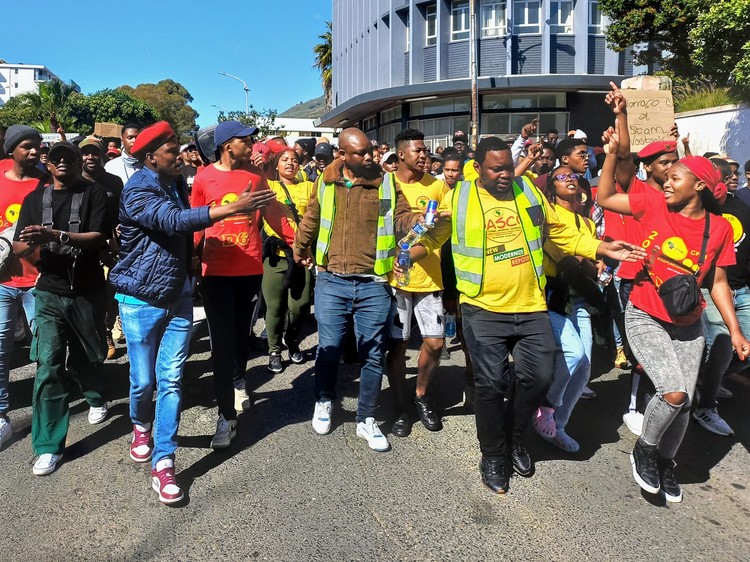
16 August 2023
Students marched to Parliament on Wednesday to hand over a petition calling on Blade Ndzimande, Minister of Higher Education and Training, to scrap the new direct payment scheme. Photo: Marecia Damons
More than 200 students from higher learning institutions across Cape Town took to the streets on Wednesday voicing frustrations over the National Student Financial Aid Scheme (NSFAS) funding system.
NSFAS beneficiaries at universities and TVET colleges started receiving their allowances through the NSFAS bank card last month. Previously, students received their allowances directly from their learning institution. However, students said there have been glitches in the system and many of them had not received their allowances. Others said they had been recently kicked off the financial aid scheme, and requests to appeal against this had gone unanswered.
Students held posters reading, “Blade, we are hungry” and “Too valuable to protest but not enough to be funded”, as they marched from Hanover Street to Parliament.
They demanded that NSFAS scrap its direct payment system and abandon its accommodation allowance limit, and that the Special Investigating Unit investigate NSFAS.
Their protest follows the eviction of over 300 Cape Peninsula University of Technology (CPUT) students from private accommodation on Tuesday, as reported by EWN.
Mandla Notyawa, SRC president at the University of the Western Cape said the funding scheme had introduced a R45,000 limit on accommodation allowances and a policy where NSFAS does not cover accommodation fees for students completing modules that account for less than 60 credits.
“Now a student comes all the way from the Eastern Cape to come and study at CPUT. You can’t study at home, you have to be here in Cape Town. Where are you going to stay? What are you going to eat?” Notyawa asked.
Students had marched to the NSFAS head offices in May, but Notyawa said the funding scheme had still not responded to their list of demands. They also sent a list of demands to the Department of Higher Education and Training (DHET) and office of the Presidency in June, but had yet to receive a response. “We are now seeking that Parliament intervene,” Notyawa said.
Reagan Johnson, a first-year student at Stellenbosch University, said, “My cap has been R13,500 (per year) for food. I’m over that limit for the whole semester so I don’t have food. I’m depending on my living allowance which is R300 per month. I must buy toiletries and groceries with that now.”
Johnson said that R300 is not enough to cover his basic necessities. “These are peaceful protests to show our grievances.”
A CPUT student who asked to remain anonymous said students were worried about the risk of getting into debt because of the R45,000 limit on accommodation. The student said the residence costs are well over R50,000.
The student said Tuesday’s evictions were the result of insufficient NSFAS funding for private student accommodation.
The memorandum was signed by Member of Parliament Tebogo Letsie and Deputy Director-General for Higher Education and Training Marcia Socikwa. The students also handed over a petition, with more than 1,600 signatures, calling for the new payment system to be scrapped.
Letsie said Parliament’s higher education portfolio committee was “also concerned about some of the issues that have been raised about NSFAS”.
“I share the sentiments of those who are saying that it’s almost the end of the year and their appeals have still not been responded to. Last week Thursday we went to NSFAS and asked them what they were doing. How can they expect students to not receive allowances to study and write examinations, and still not respond to their appeals? What is the problem at NSFAS?
“I can guarantee you that that is not only your concern in the Western Cape but the country. It is our collective concern, And we will get to the bottom of it,” said Letsie.
He also said MPs would ask NSFAS for a detailed report on how decisions were taken about which students were no longer to be funded. Parliament had also asked NSFAS for a report on the direct payment system.
The students asked for an acknowledgement of receipt of their memo from the office of Minister of Higher Education Blade Ndzimande and the head of the portfolio committee Nompendulo Mkhatshwa within 24 hours, and a response to their demands within seven working days.
“Otherwise,” they said in their memo, “we will be given no choice but to intensify our fight towards injustices created by NSFAS.”